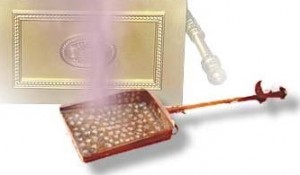 In the story of Korach’s rebellion (Numbers 16-17), 250 men join the campaign against Moses. While Korach and his partners Dathan and Abiram are punished with the earth miraculously swallowing them alive, the 250 men meet a different, more honorable fate. While holding fire-pans filled with incense, they are consumed by a fire emanating from G-d’s presence in the Tabernacle. After their death, Elazar the priest is told to gather the fire-pans and build them into the structure of the Tabernacle’s Altar to serve as a sign for all to see.
In the story of Korach’s rebellion (Numbers 16-17), 250 men join the campaign against Moses. While Korach and his partners Dathan and Abiram are punished with the earth miraculously swallowing them alive, the 250 men meet a different, more honorable fate. While holding fire-pans filled with incense, they are consumed by a fire emanating from G-d’s presence in the Tabernacle. After their death, Elazar the priest is told to gather the fire-pans and build them into the structure of the Tabernacle’s Altar to serve as a sign for all to see.
What was this sign? The text later explains it would serve as a reminder that no one but the priestly family should serve in the Tabernacle. But it’s interesting that this reason is only given after the fire-pans are hammered into the altar. The original instructions to Elazar simply state they should be a sign, implying that there was another, stand-alone purpose.
The Netziv (R. Naftali Tzvi Yehuda Berlin, 1816-1893) understands that while Korach ultimately campaigned for his own honor, the 250 men acted with the purest of motivations. Their love for G-d burned in them, and they yearned to express this love through the physical service in the Tabernacle. Not being of the Tribe of Levi, they never had that opportunity. They reasoned that through Korach’s rebellion they could finally demonstrate their willingness to give their very lives to the service of the Al-mighty.
These 250 men were wrong to leap to levels of spiritual service that were beyond their grasp, but their pure intentions did not go unrecognized. They were honored with a death by Divine fire, and their fire-pans were then put on display as a tribute to their burning love for G-d.
Pure and honorable intentions can sometimes lead to a deviation from the path of G-d, and there are, unfortunately, consequences for that. Nonetheless, G-d wanted a sign posted on the altar that He will never overlook the pure motives that inspire us. We want to come close to Him, yet we often make mistakes in the process. Regardless of whether we successfully attain the closeness we seek, there’s a sign on the altar acknowledging the spiritual hope and love that motivated us.
Good Shabbos!
Rabbi Mordechai Dixler
Program Director, Project Genesis – Torah.org




Your last paragraph made me cry, but it comforted me at the same time. My son committed suicide 2 years ago, and I believe that pure and honorable intentions played a role in the way you describe. You have given me a kind of hope.
A good article
Such a nuanced and ultimately humane interpretation of this Torah portion. I sigh, am comforted, and sigh again. Thank you.
Thank you for this wonderful article. So we must have fear of god and be desirous to serving but through the ways that are already set up. Other way we could fall in apostasy and be punished for that.
Keep up the work of the LORD. That was an awesome message.
If Samuel was descended from Korach, and thus not Aharon,how was he eligible to be Kohen Gadol after Eli?
I learned that the firepans were used as a warning not to do this. Even if the motivation is a good one, if it is against what Hashem asks it is an aveirah. Please tell me the source.
Thnks
Yes, they were a warning. I mentioned this in the piece. The source is the Netziv in his commentary called Ha’amek Davar on the verses that address Elazar installing the pans on the altar. His point is that an Aveirah, when someone does something wrong, there can be mixed motivations. G-d takes a nuanced approach of punishing for the wrong, but recognizing and rewarding the good. People often have trouble sorting our mixed motivations and tend to judge matters as either absolutely wrong or absolutely right. The Al-mighty in His infinite wisdom can address each element of our actions with complete exactness.
From the second book of Psalms, chapter 43. And when the earth opened and swallowed Korach and his sons, the sons were saved by landing on a ledge overlooking the fires burning below. From the ledge they sang the song of Psalms 46:1-8. “Why are you bowed down, my soul, and why do you feel unfulfilled? Await G-d, for I will yet thank Him for the salvation of His countenance.” As Korach’s sons stood on that ledge, they told that they could not mourn for themselves when they were striving toward a relationship with the light of G-d. True peace of mind comes when we reach out and embrace G-d. (information paraphrased from Rabbi Rubin Tehillim 43)
I’m not sure of the point you’re making in relation to the piece, but perhaps your highlighting another instance of goodness amidst the wrong.